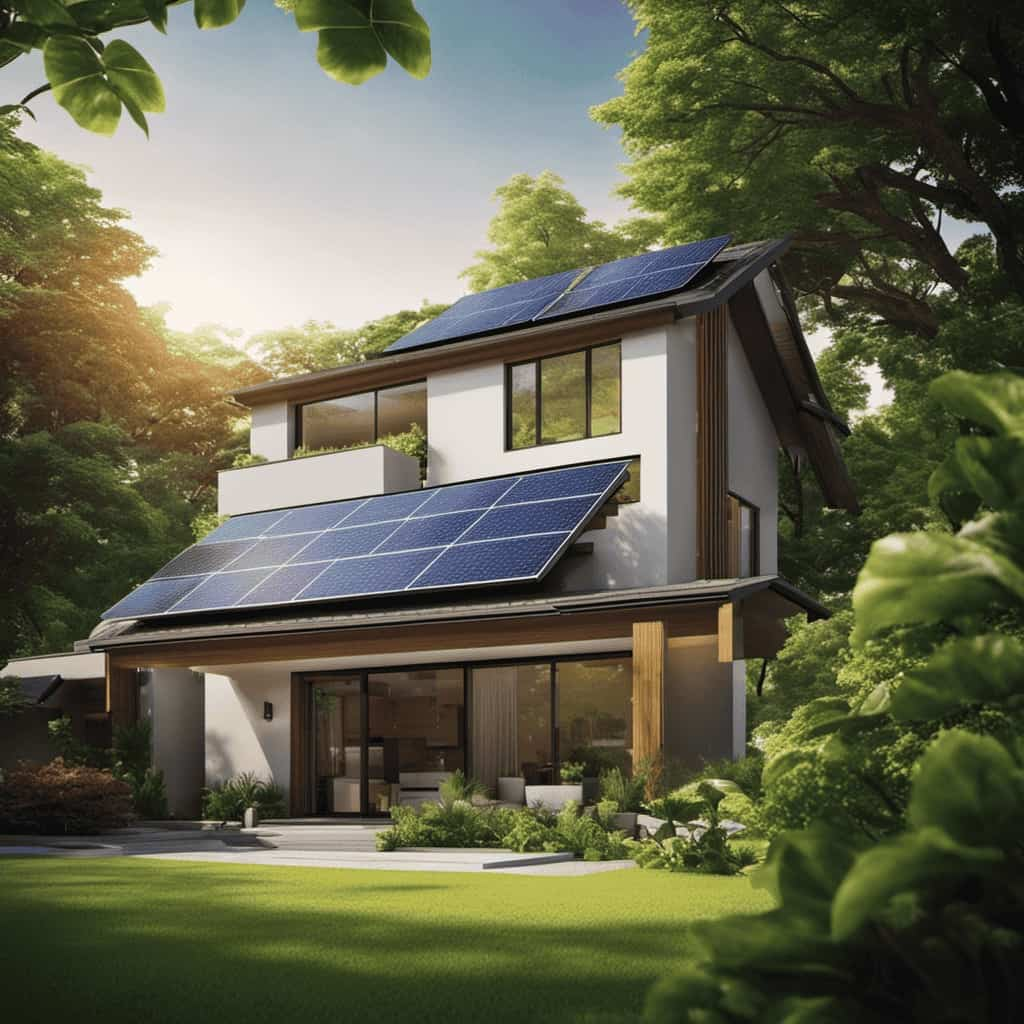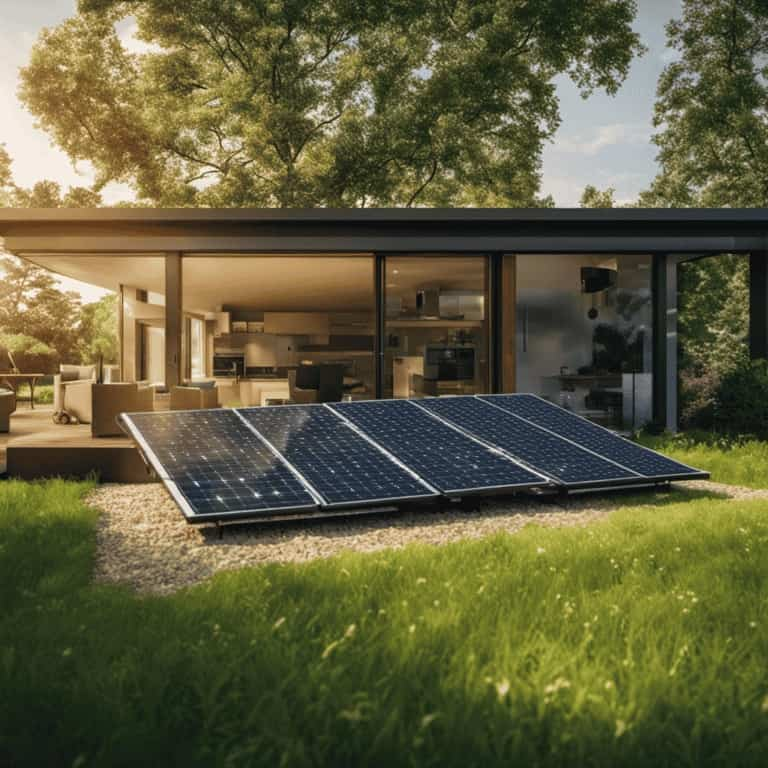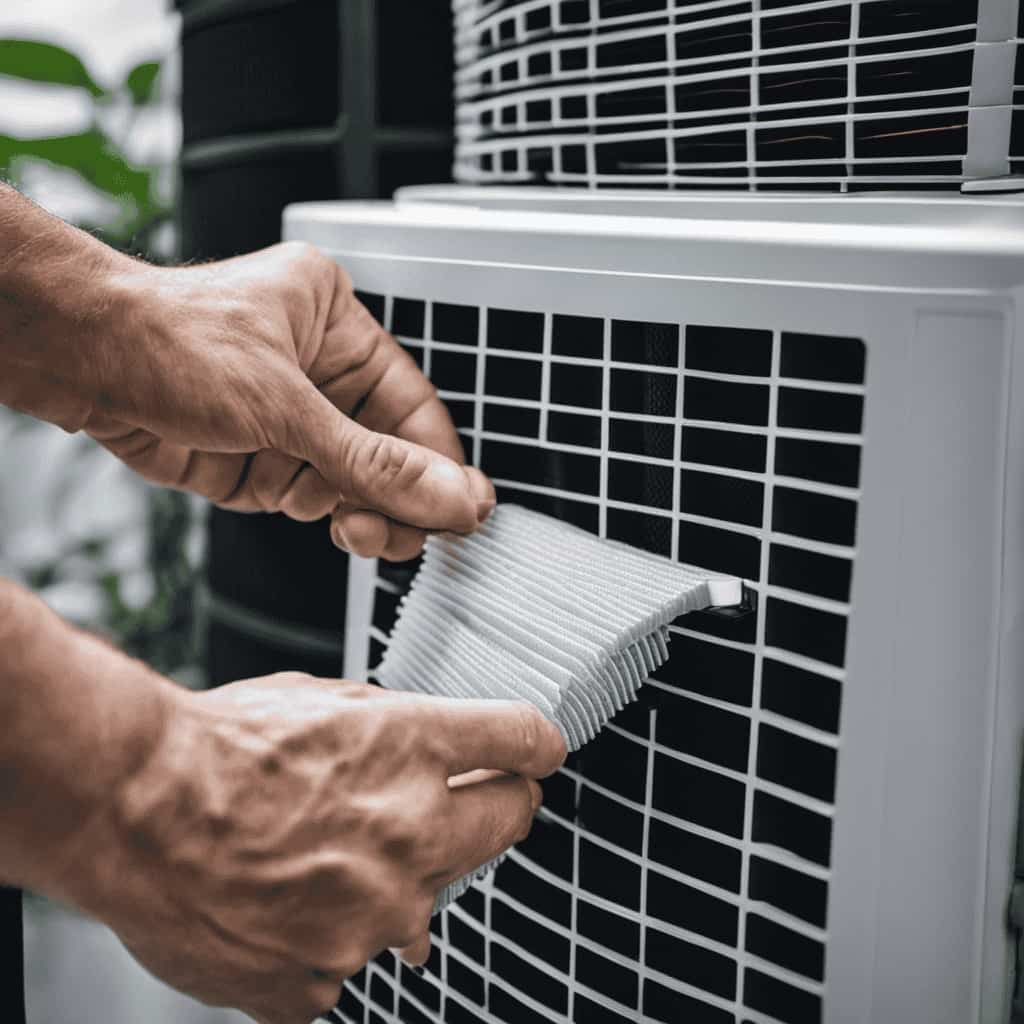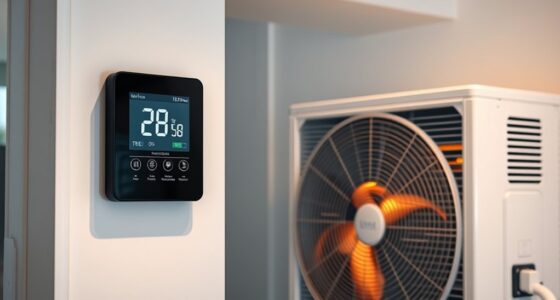Energy-efficient heat pump HVAC systems offer the ideal blend of comfort and conservation.
Curious about the benefits and workings of these innovative systems? Look no further. We, your knowledgeable guides, will shed light on the inner workings of energy-efficient heat pump HVAC systems.
From their efficient operation to the factors you should consider when choosing one, we have all the answers.
So, buckle up, and let’s embark on an energy-saving adventure together!

Key Takeaways
- Energy-efficient heat pump HVAC systems transfer heat from one area to another instead of generating heat or cooling air.
- These systems offer higher energy efficiency compared to traditional systems and can both heat and cool a space.
- They provide cost-effective solutions for heating and cooling, reduce greenhouse gas emissions, lower energy bills, and do not rely on fossil fuels.
- Factors to consider when choosing an energy-efficient heat pump HVAC system include efficiency ratings, variable speed compressors, proper sizing, available incentives and rebates, and long-term costs and benefits.
How Do Energy-Efficient Heat Pump HVAC Systems Work
We’ll explain how energy-efficient heat pump HVAC systems work.
These systems utilize energy efficient heat pump technology to provide both heating and cooling for buildings. Heat pumps work by transferring heat from one area to another, rather than generating heat or cooling air like traditional HVAC systems.
During the winter, the heat pump extracts heat from the outside air and transfers it inside, effectively warming the building. In the summer, the process is reversed, and the heat pump extracts heat from the indoor air and releases it outside, cooling the building.
This technology offers several advantages over conventional HVAC systems, such as higher energy efficiency, reduced operating costs, and the ability to both heat and cool a space. Heat pump HVAC systems are a smart choice for those seeking sustainable and cost-effective heating and cooling solutions.

Benefits of Energy-Efficient Heat Pump HVAC Systems
There are several benefits to using energy-efficient heat pump HVAC systems. These systems are not only cost-effective but also have a positive environmental impact. By using the heat from the air or ground, heat pump HVAC systems can provide efficient heating and cooling without relying on fossil fuels. This reduces greenhouse gas emissions and helps to combat climate change. Additionally, energy-efficient heat pump HVAC systems can significantly lower energy bills by consuming less electricity compared to traditional heating and cooling systems. To further highlight the benefits of energy-efficient heat pump HVAC systems, consider the following table:
| Benefits |
|---|
| Cost-effective |
| Environmental impact |
| Energy savings |
In the next section, we will discuss the factors to consider when choosing an energy-efficient heat pump HVAC system.
When considering the benefits of energy-efficient heat pump HVAC systems, it becomes evident that these systems offer both financial and environmental advantages. Transitioning into the next section, we will explore the important factors to keep in mind when selecting the most suitable energy-efficient heat pump HVAC system for your needs.
Factors to Consider When Choosing an Energy-Efficient Heat Pump HVAC System
When choosing an energy-efficient heat pump HVAC system, we need to consider several factors. Here are two important sub-lists to help you make an informed decision:

Energy Efficient Heat Pump Installation
Efficiency Ratings: Look for a system with a high Seasonal Energy Efficiency Ratio (SEER) and Heating Seasonal Performance Factor (HSPF) ratings. These ratings indicate the system’s efficiency in cooling and heating respectively.
Variable Speed Compressor: Opt for a heat pump with a variable speed compressor. This feature allows the system to adjust its performance based on the heating or cooling needs, resulting in optimal energy efficiency.
Cost Effective Heat Pump Options

Size: Ensure the heat pump is properly sized for your home. An oversized unit will consume more energy, while an undersized unit may struggle to meet your heating and cooling needs.
Incentives and Rebates: Research available incentives and rebates for energy-efficient heat pump installations. These can help offset the initial investment and reduce long-term costs.
Considering these factors will help you select an energy-efficient heat pump HVAC system that not only saves energy but also provides cost-effective heating and cooling solutions for your home.
Tips for Maximizing the Energy Efficiency of Heat Pump HVAC Systems
To achieve maximum energy efficiency with our heat pump HVAC systems, we should focus on the following tips.

Implementing energy-saving techniques and following maintenance tips can significantly improve the performance of our systems while reducing our energy consumption.
Firstly, it’s essential to regularly clean or replace the air filters in our heat pump HVAC systems. Clogged filters restrict airflow, making the system work harder and consume more energy.
Secondly, scheduling regular maintenance with a qualified technician is crucial. They can inspect and service the system, ensuring it operates at peak efficiency. Additionally, we should also consider installing a programmable thermostat to optimize temperature settings and reduce energy usage when we’re away.
Furthermore, proper insulation of our homes is crucial for maximizing energy efficiency. Insulating windows, doors, and walls can prevent heat loss or gain, reducing the workload on our heat pump HVAC systems.

Lastly, sealing ductwork and eliminating air leaks can prevent energy wastage and improve system efficiency.
The Future of Energy-Efficient Heat Pump HVAC Systems
In the future, we can expect advancements in energy-efficient heat pump HVAC systems to further enhance their performance and reduce our energy consumption. These advancements will be driven by the integration of smart technology into heat pump systems, allowing for more precise control and optimization of energy usage.
Smart thermostats will enable users to remotely monitor and adjust their HVAC systems, ensuring maximum efficiency and comfort. Additionally, advancements in compressor technology will improve the overall efficiency of heat pumps, resulting in reduced energy consumption and lower environmental impact.
Furthermore, the development of more sustainable refrigerants will contribute to the overall environmental friendliness of heat pump systems. As we move forward, it’s exciting to envision a future where energy-efficient heat pump HVAC systems play a crucial role in reducing our carbon footprint and creating a more sustainable world.

Frequently Asked Questions
Are Energy-Efficient Heat Pump HVAC Systems Suitable for Both Residential and Commercial Buildings?
Yes, energy-efficient heat pump HVAC systems are suitable for both residential and commercial buildings. They have undergone a cost effectiveness analysis, proving their efficiency. These systems provide effective heating and cooling, reducing energy consumption and costs.
Can Energy-Efficient Heat Pump HVAC Systems Be Used in Extreme Climates With Very Cold or Very Hot Temperatures?
Yes, energy-efficient heat pump HVAC systems are suitable for extreme climates. They can effectively heat and cool buildings in very cold or hot temperatures. These systems are designed to work efficiently in different building types.
Are There Any Government Incentives or Rebates Available for Installing Energy-Efficient Heat Pump HVAC Systems?
Government incentives and rebates can help offset the installation costs of energy-efficient heat pump HVAC systems. These incentives aim to promote energy savings and encourage the adoption of more efficient heating and cooling technologies.
How Long Do Energy-Efficient Heat Pump HVAC Systems Typically Last Before Needing Replacement?
Energy-efficient heat pump HVAC systems typically last 15 to 20 years before needing replacement. Factors such as maintenance, usage, and environmental conditions can affect their lifespan. Regular maintenance can help prolong the system’s lifespan.

Are There Any Maintenance Requirements or Specific Servicing Needs for Energy-Efficient Heat Pump HVAC Systems?
Maintenance requirements and specific servicing needs for energy-efficient heat pump HVAC systems depend on various factors such as the type of system, manufacturer’s guidelines, and usage. Regular inspections, filter cleaning/replacement, and professional servicing are key to ensuring optimal performance and longevity.
What Are the Benefits of Choosing the Best Energy-Efficient Heat Pump HVAC Systems?
Choosing the best energy-efficient heat pump hvac systems offers numerous benefits. These systems consume less energy, reducing monthly utility bills. They also provide effective heating and cooling, improving indoor comfort. Additionally, energy-efficient heat pump HVAC systems are environmentally friendly, emitting fewer greenhouse gases. Their advanced technology ensures long-term durability, saving maintenance costs.
Conclusion
In conclusion, energy-efficient heat pump HVAC systems are like the superheroes of heating and cooling. They work tirelessly to keep us comfortable while minimizing energy consumption.
With their ability to transfer heat from one place to another, they provide numerous benefits, including lower energy bills and reduced carbon emissions.
However, choosing the right system and implementing energy-saving practices are crucial for maximizing their efficiency.

As we move forward, the future of energy-efficient heat pump HVAC systems looks promising, offering even greater advancements in sustainable heating and cooling technology.









